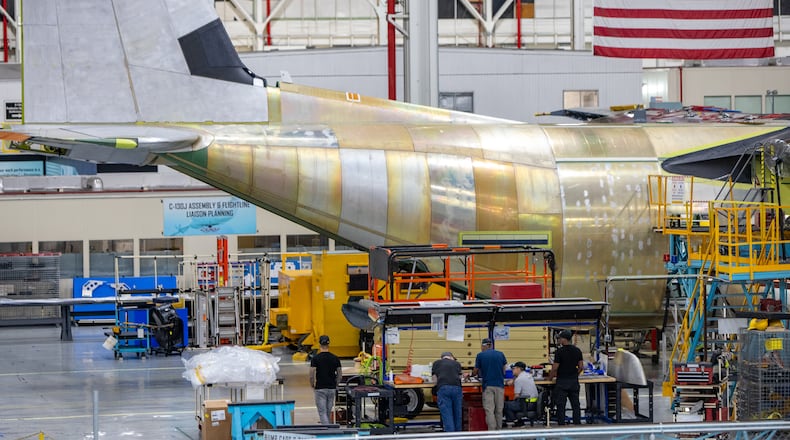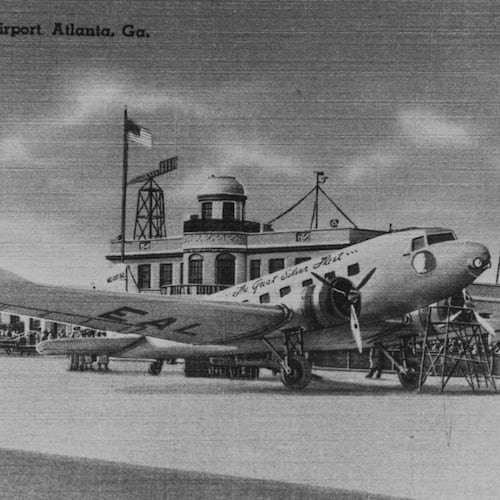Like Detroit with cars or Wall Street with banks, Atlanta has intertwined its reputation with aviation.
The city’s airport — the busiest by passenger volume in the world — is as central to Atlanta’s image as Coca-Cola and the 1996 Olympic Games. But Hartsfield-Jackson International Airport is just one part of Georgia’s bustling aerospace industry, which ranges from jet turbine manufacturing to military drone innovation.
The Metro Atlanta Chamber, which acts as the civic and business voice of the region’s corporate interests, is launching a new initiative to target aerospace and defense companies. While it’s already one of Georgia’s largest industries, chamber leadership said it’s a fast-evolving area that the region can’t afford to take for granted.
“Economic development is sales and marketing,” said Kristi Brigman, the chamber’s chief economic development officer. Aerospace “is an area that we should be getting the respect we deserve, and that also leads to growth.”
The chamber has teams dedicated to recruiting investment from specific clusters, including financial technology, life sciences, advanced manufacturing and green technology. Adding aerospace and defense to the mix is designed to provide specialized support to the needs and challenges facing both industry stalwarts and scrappy startups in the sector.
The state’s top export in 2024 was civilian aircraft and ancillary parts, and Georgia boasts a robust network of aviation, flight and drone companies: Delta Air Lines, Lockheed Martin, Gulfstream Aerospace Corp. and Pratt & Whitney are just a few.
Having a variety of long-standing industry stakeholders is important to attracting startups and fostering innovation, said Georgia Tech professor Dimitri Mavris. He runs the institute’s Aerospace Systems Design Laboratory and is executive director of its applied systems engineering master’s program.
“Companies come to me and say what problems they’re facing, usually in an exploratory nature,” Mavris said. “They cannot find people to work on these things … so we give the students the project as part of their coursework.”
Credit: Kathy Almand
Credit: Kathy Almand
Education is one of the five key areas the chamber is targeting when trying to woo aerospace investment. The others are manufacturing, maintenance, operations and hosting industry conferences and events.
Steve Shaffer, the aerospace director at the Georgia Department of Economic Development’s Center of Innovation, said “the sky’s the limit” given the growth trajectory of aviation-related industries.
“We need to make sure we have our fingers on the pulse of those new and emerging technologies,” Shaffer said.
‘A shared challenge’
The Metro Atlanta Chamber’s aerospace ambitions are broad, but there are similar efforts taking place across the U.S. targeting niche innovations with aviation.
Minnesota has created one such model that Atlanta officials are using for strategic inspiration.
Known for its biofuel industries, the Midwest state took steps in 2023 to court companies making sustainable aviation fuel, also known as SAF. The alternative fuel replaces jet fuel and is seen as a critical technology in decarbonizing commercial air travel.
“It’s a shared challenge to decarbonize air travel and enhance America’s energy security,” said Peter Frosch, CEO of Greater MSP, the economic development partnership for the Minneapolis-St. Paul region. “This is a product that airlines in the U.S. are going to want for decades, and we don’t want to be importing it.”
Frosch helped establish the Minnesota SAF Hub because of the anticipated growth in that sector. The U.S. Department of Energy projects that SAF could support more than 70,000 jobs and represent $44 billion of investment by 2030, and that would likely only cover about 10% of the U.S.’s jet fuel demand.
Last year, the Minnesota SAF Hub announced plans for a SAF blending facility with Delta at the Minneapolis-St. Paul International Airport and DG Fuels released plans for a $5 billion facility to produce SAF using agricultural and wood waste.
Credit: Miguel Martinez
Credit: Miguel Martinez
Georgia has gotten some SAF investment, such as LanzaJet’s facility in Soperton, about halfway between Macon and Savannah along I-16. But Frosch said Atlanta can further leverage its aerospace infrastructure to double down on the emerging fuel technology.
“Atlanta is thinking about SAF from aerospace,” he said. “Here (in Minnesota), it’s SAF from bio manufacturing.”
Georgia leaders and companies have also focused on hydrogen as a jet fuel alternative. Delta, Airbus and Hartsfield-Jackson are studying the feasibility of hydrogen fuel, while automakers like the Hyundai Motor Group are using it as a diesel alternative in semitrucks in Coastal Georgia.
Industry acceleration
Brigman said alternative fuels are just one tail wind accelerating the growth of the aerospace and defense industries.
Seven aerospace-related relocations or expansions were announced in metro Atlanta since 2021, adding more than 1,160 jobs. The most recent was weeks ago when turbojet engine maker PBS Aerospace announced a planned North American headquarters in Roswell.
The defense sector has also rapidly grown with the Department of Defense’s budget for missiles and munitions requests increasing 340% over the past decade, according to consulting firm Deloitte. Atlanta has attracted multiple defense contractors in recent years, such as drone developer Anduril Industries.
“That speaks to the recruitment opportunities,” Brigman said of the anticipated increase in aerospace and defense jobs. “We do have active projects right now, and I think we’re going to continue to see more coming in the next few years.”
Credit: Anduril Industries
Credit: Anduril Industries
Mavris said education can’t be overlooked when it comes to these technically demanding industries — some of which are literal rocket science.
A tenth of all aerospace Ph.D.s graduate from Georgia Tech, which he said gives the Atlanta area an unparalleled advantage with recruitment.
“You’re creating an ecosystem where there are jobs and people have no reason to leave,” Mavris said.
About the Author
Keep Reading
The Latest
Featured







